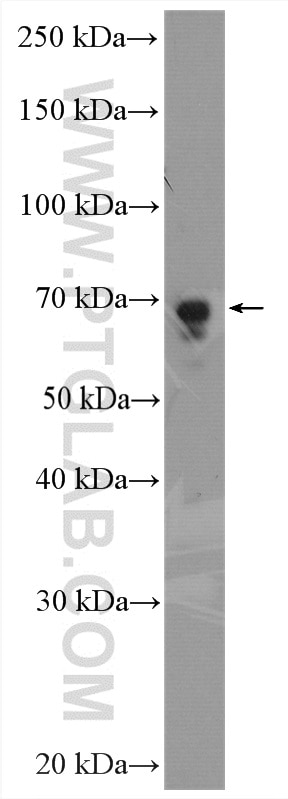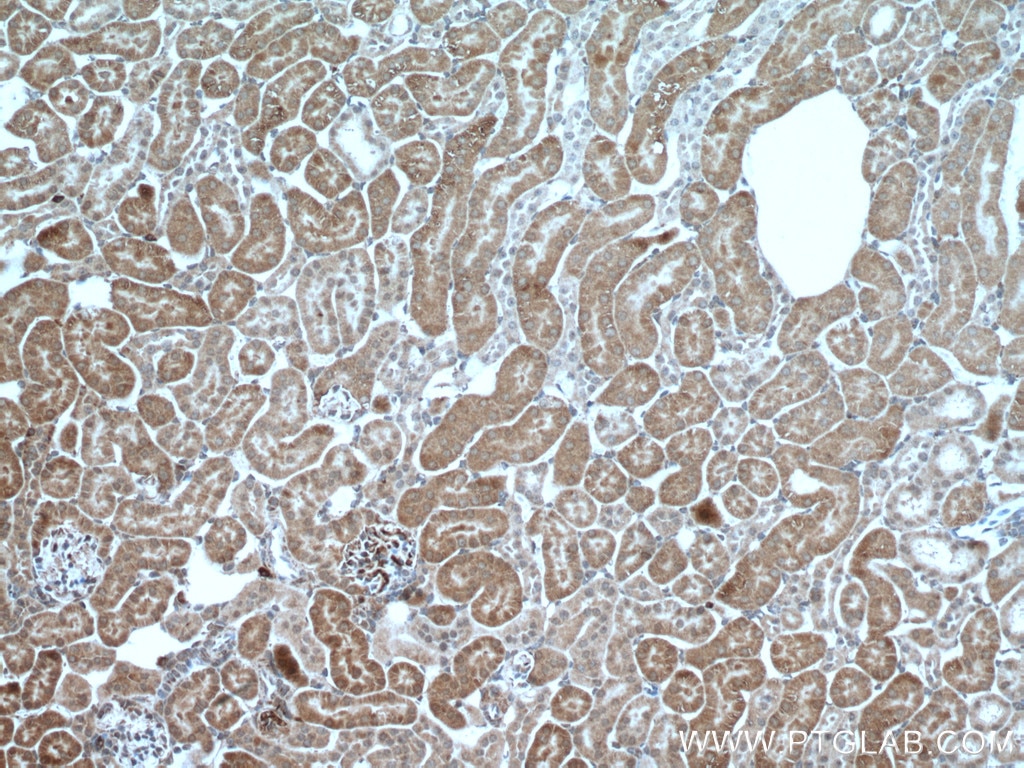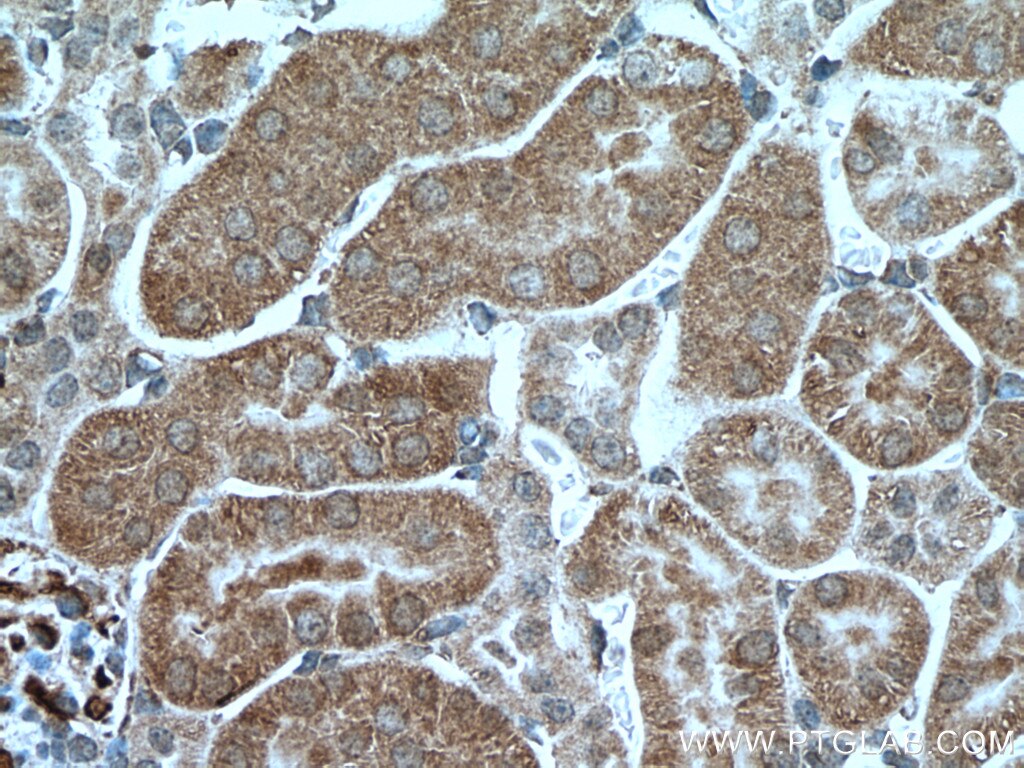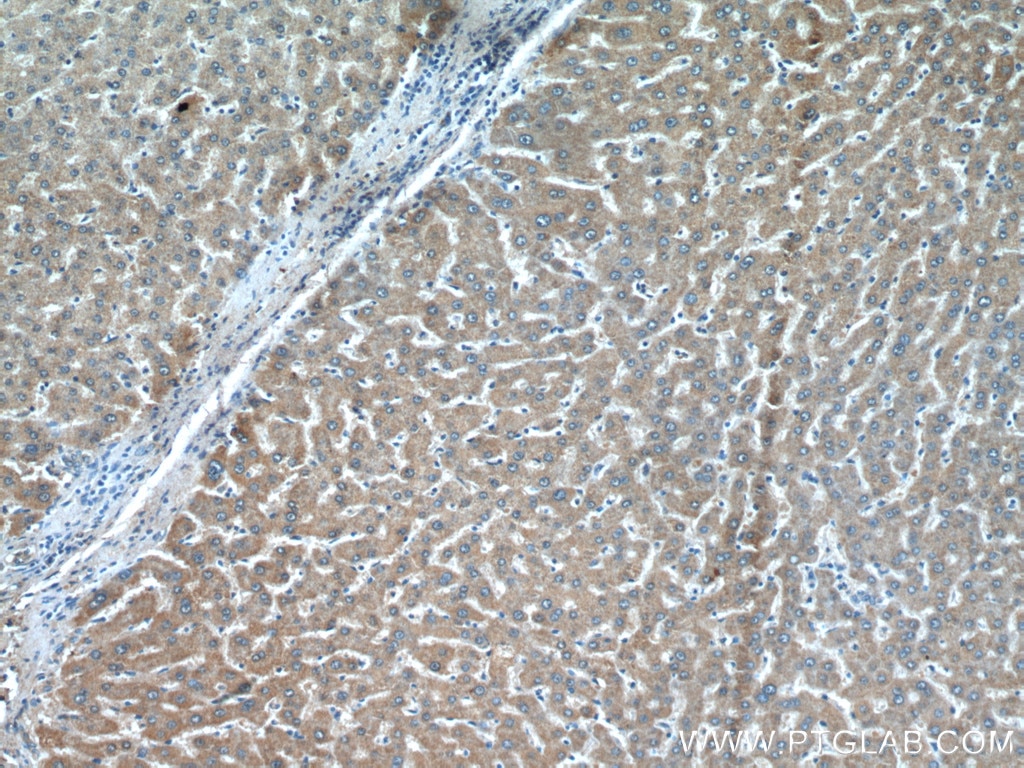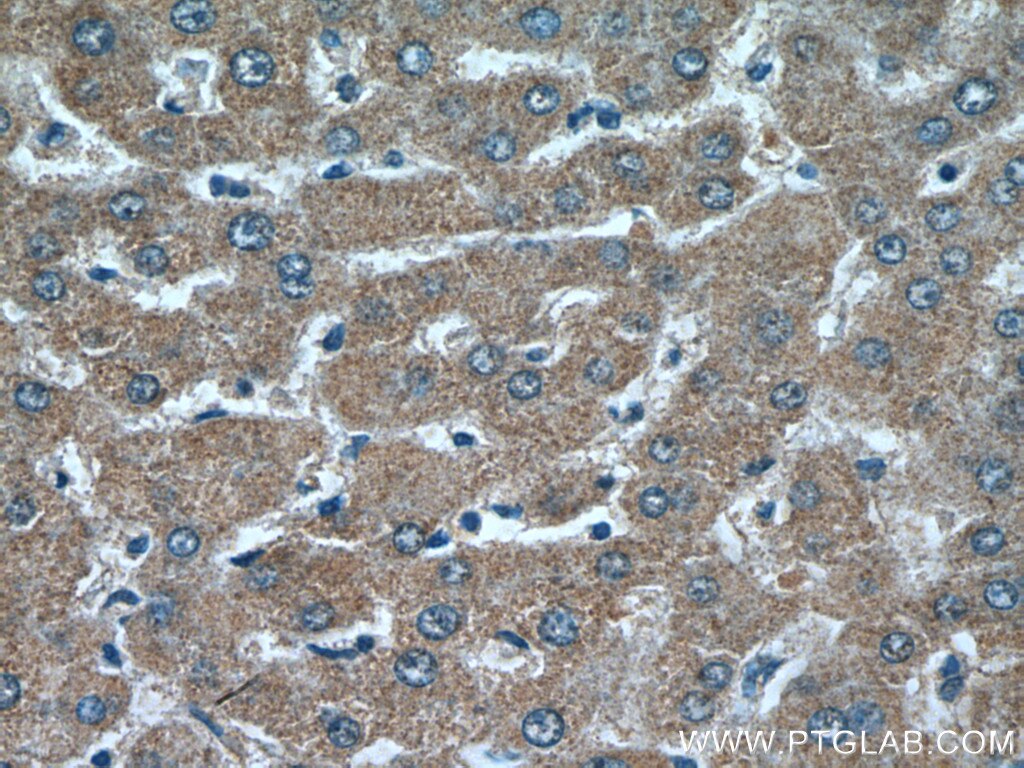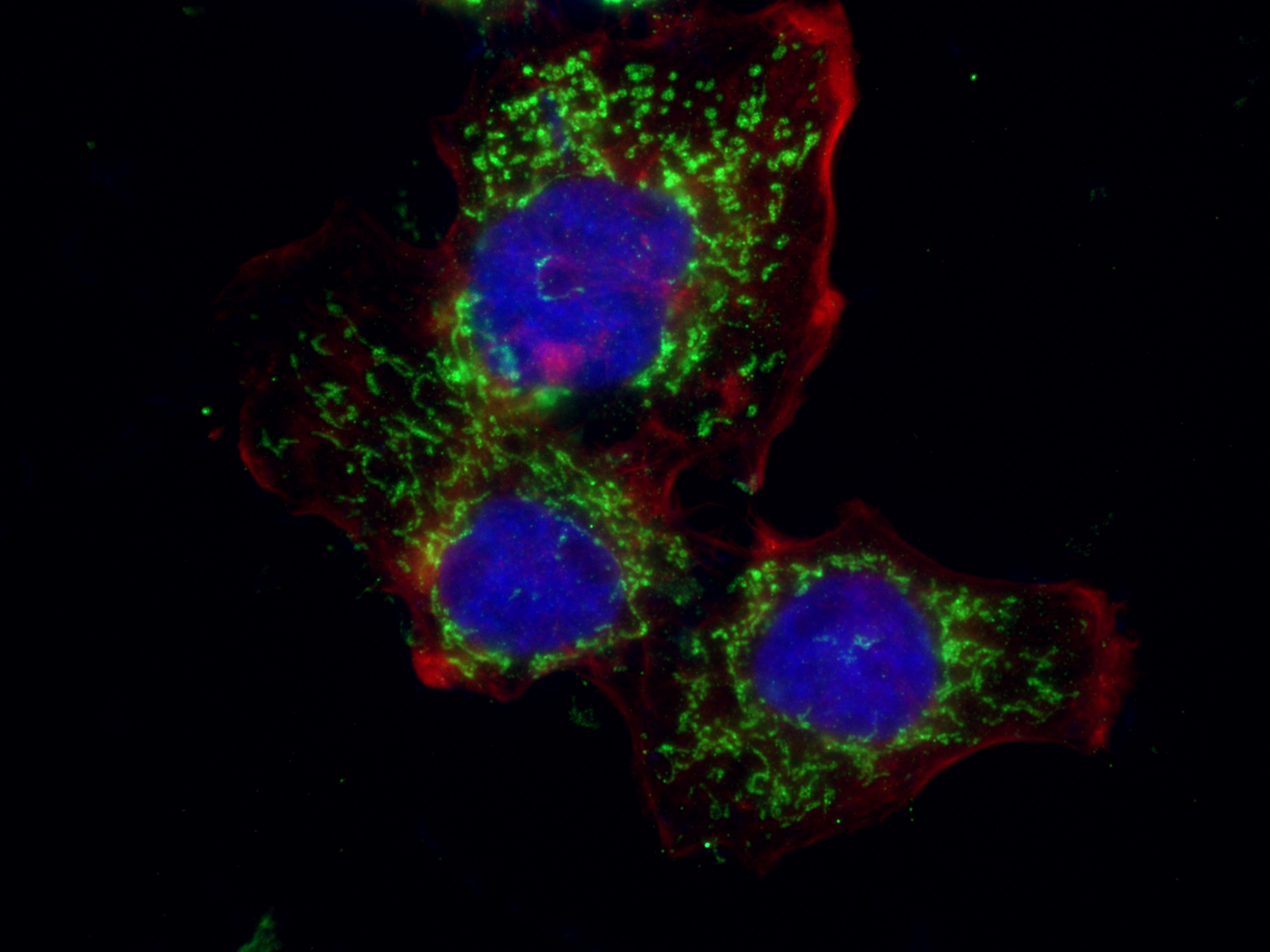Anticorps Polyclonal de lapin anti-PCK1/2
PCK1/2 Polyclonal Antibody for WB, IHC, IF/ICC, ELISA
Hôte / Isotype
Lapin / IgG
Réactivité testée
Humain, rat, souris et plus (1)
Applications
WB, IHC, IF/ICC, CoIP, ELISA
Conjugaison
Non conjugué
N° de cat : 14892-1-AP
Synonymes
Galerie de données de validation
Applications testées
| Résultats positifs en WB | tissu cérébral de souris, tissu cérébral de rat, tissu hépatique de souris |
| Résultats positifs en IHC | tissu de cancer du sein humain, tissu de cancer du foie humain, tissu rénal de souris il est suggéré de démasquer l'antigène avec un tampon de TE buffer pH 9.0; (*) À défaut, 'le démasquage de l'antigène peut être 'effectué avec un tampon citrate pH 6,0. |
| Résultats positifs en IF/ICC | cellules MCF-7, |
Dilution recommandée
| Application | Dilution |
|---|---|
| Western Blot (WB) | WB : 1:500-1:1000 |
| Immunohistochimie (IHC) | IHC : 1:100-1:1000 |
| Immunofluorescence (IF)/ICC | IF/ICC : 1:50-1:500 |
| It is recommended that this reagent should be titrated in each testing system to obtain optimal results. | |
| Sample-dependent, check data in validation data gallery | |
Applications publiées
| KD/KO | See 2 publications below |
| WB | See 28 publications below |
| IHC | See 5 publications below |
| IF | See 3 publications below |
| CoIP | See 1 publications below |
Informations sur le produit
14892-1-AP cible PCK1/2 dans les applications de WB, IHC, IF/ICC, CoIP, ELISA et montre une réactivité avec des échantillons Humain, rat, souris
| Réactivité | Humain, rat, souris |
| Réactivité citée | rat, Humain, porc, souris |
| Hôte / Isotype | Lapin / IgG |
| Clonalité | Polyclonal |
| Type | Anticorps |
| Immunogène | PCK1/2 Protéine recombinante Ag6681 |
| Nom complet | phosphoenolpyruvate carboxykinase 2 (mitochondrial) |
| Masse moléculaire calculée | 71 kDa |
| Poids moléculaire observé | 66-71 kDa |
| Numéro d’acquisition GenBank | BC001454 |
| Symbole du gène | PCK2 |
| Identification du gène (NCBI) | 5106 |
| Conjugaison | Non conjugué |
| Forme | Liquide |
| Méthode de purification | Purification par affinité contre l'antigène |
| Tampon de stockage | PBS with 0.02% sodium azide and 50% glycerol |
| Conditions de stockage | Stocker à -20°C. Stable pendant un an après l'expédition. L'aliquotage n'est pas nécessaire pour le stockage à -20oC Les 20ul contiennent 0,1% de BSA. |
Informations générales
PCK2(phosphoenolpyruvate carboxykinase [GTP], mitochondrial) is also named as PEPCK2, PEPCK-M and belongs to the phosphoenolpyruvate carboxykinase [GTP] family. It catalyses the irreversible conversion of oxaloacetate to phosphoenolpyruvate, an important initial step in hepatic gluconeogenesis.Defects in PCK2 are the cause of mitochondrial phosphoenolpyruvate carboxykinase deficiency (M-PEPCKD). It has 2 isoforms produced by alternative splicing with the molecular weight of 71 kDa and 48 kDa. This antibody has weak cross-reactivity with PCK1 protein due to high sequence homology between PCK1 and PCK2.
Protocole
| Product Specific Protocols | |
|---|---|
| WB protocol for PCK1/2 antibody 14892-1-AP | Download protocol |
| IHC protocol for PCK1/2 antibody 14892-1-AP | Download protocol |
| IF protocol for PCK1/2 antibody 14892-1-AP | Download protocol |
| Standard Protocols | |
|---|---|
| Click here to view our Standard Protocols |
Publications
| Species | Application | Title |
|---|---|---|
Sci Rep TCF7L2 involvement in estradiol- and progesterone-modulated islet and hepatic glucose homeostasis. | ||
Mol Nutr Food Res Douchi Peptides Vy and Sfllr Improve Glucose Homeostasis and Gut Dysbacteriosis In High-Fat Diet-Induced Insulin Resistant Mice | ||
J Nat Prod Effect of 1-Deoxynojirimycin Isolated from Mulberry Leaves on Glucose Metabolism and Gut Microbiota in a Streptozotocin-Induced Diabetic Mouse Model | ||
J Biol Chem Patient-derived organotypic tissue cultures as a platform to evaluate metabolic reprogramming in breast cancer patients | ||
Mol Neurobiol Phosphoenolpyruvate Carboxykinase (PCK) in the Brain Gluconeogenic Pathway Contributes to Oxidative and Lactic Injury After Stroke. | ||
Front Pharmacol Bicyclol Regulates Hepatic Gluconeogenesis in Rats with Type 2 Diabetes and Non-alcoholic Fatty Liver Disease by Inhibiting Inflammation. |
Avis
The reviews below have been submitted by verified Proteintech customers who received an incentive for providing their feedback.
FH Kristian (Verified Customer) (06-07-2021) | PCK2 (red) is detected in proximale tubules where HIF1A-signaling is activated.
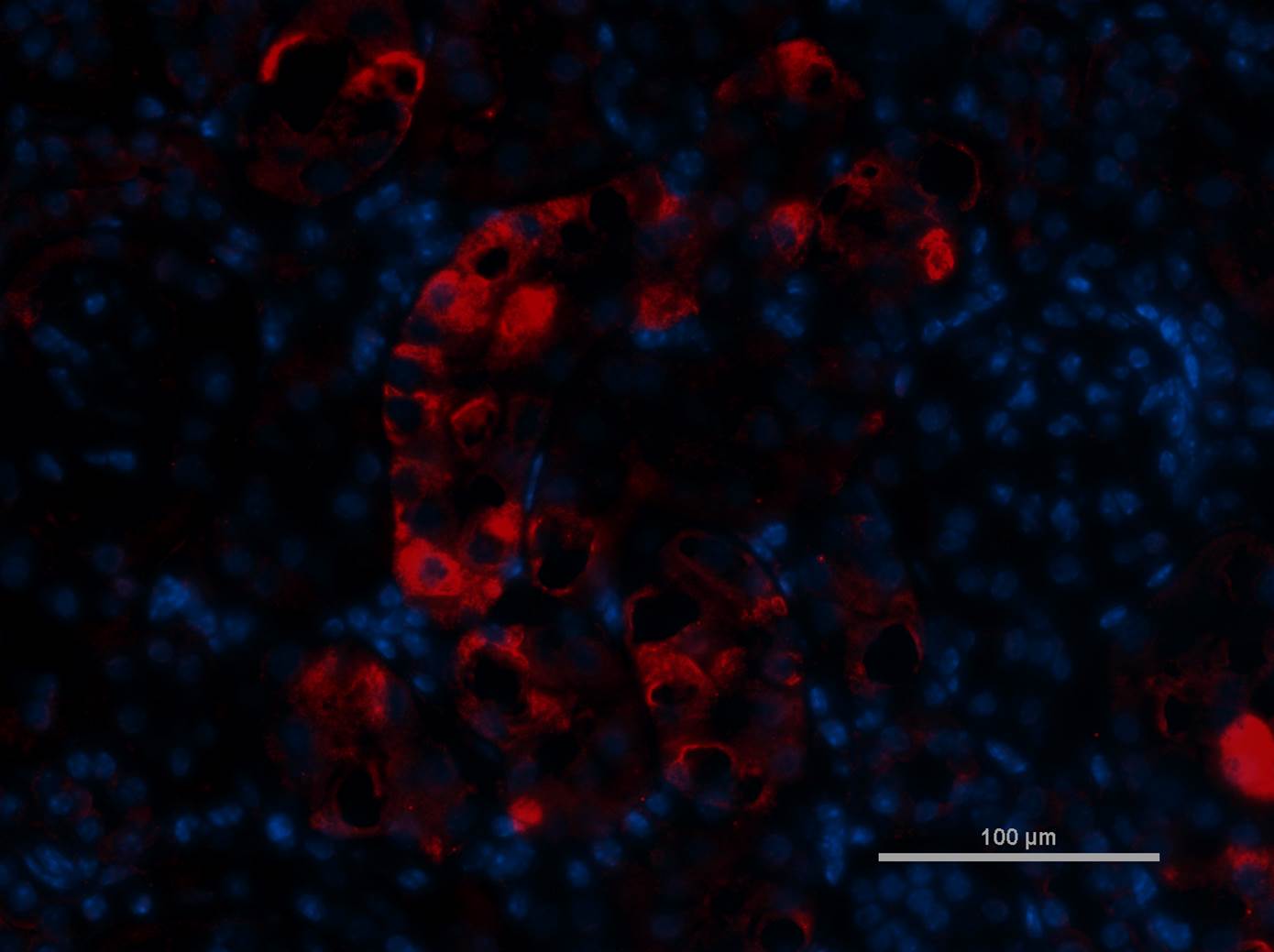 |
